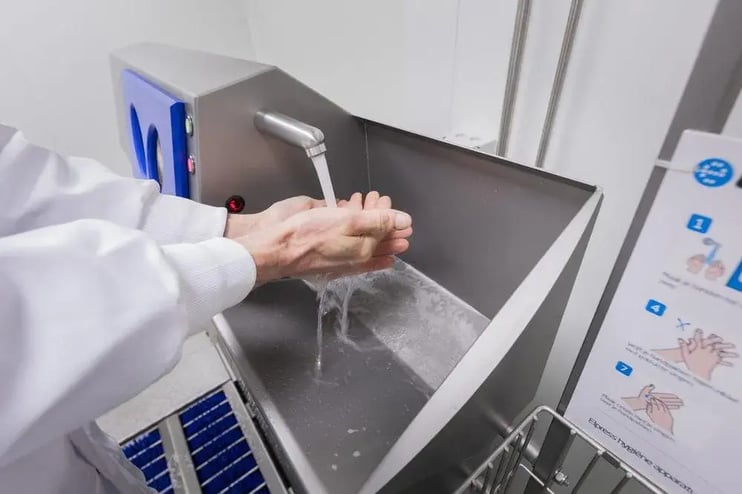Company hygiene: 5 tips for good hygiene on the factory floor

Whichever part of the food industry you work in: occupational hygiene is one of the most important and most complex aspects of the process. As a quality worker, you can’t do this all on your own: everyone plays a big role in it. They walk into the production shop day in day out, take care of cleaning the space and ensure personal hygiene. In this blog, we explain why occupational hygiene is so incredibly important and provide a few practical tips for good hygiene on the factory floor. With the correct procedures and equipment, you’ll quickly have one less thing to worry about.
As a quality worker or hygiene officer, you want the production process to run hygienically. No bacteria or viruses, no cross-contamination, no illness, no pests and no production standstill. To guarantee the quality and comply fully with all laws and regulations, it is essential for occupational hygiene to be well organised. Here, you can read 5 practical tips for obtaining the correct certificates.
Tip 1: Don’t allow personal hygiene to be an option
In every production space, workers are the biggest source of bacteria and viruses. They work with their hands and touch the food, eat a roll in the break or go to the toilet, and at home they come into contact with other people. Personal hygiene is therefore enormously important. And that is why there is so much more involved than just washing hands. We sum up the most important points for attention here:
- Hand hygiene: ensure that workers soap, wash, dry and disinfect their hands each time they enter the factory floor. And that they wear gloves while they work. If you want to be sure that this is being done well, you can opt for a hygienic entrance. What this means is that workers can only enter the production area via a turnstile once all steps have been carried out. Also read this blog: The importance of good hand hygiene in the food industry.
- Clothing regulations: let workers know which of their own clothing they are best able to wear and which items they will get from the company. Some materials are easier to clean and keep that way than others. Do they wear aprons? Then ensure that these are cleaned well before each break. An apron wash station is ideal for this.
- Hair tied back or covered: hair regularly falls out, making it a good idea to agree that workers never wear their hair loose and always put on a hair net. In this way, you’ll avoid hairs getting into or onto the food.
- Clean shoes: never let workers enter the production area wearing their own shoes. Ensure that they always change their shoes when on company premises. Because bacteria and viruses can also nestle in footwear. If you want to go a step further, then provide good (electrically operated) shoe brushes that scrub the soles properly before the wearer enters.
- Conduct: workers often want to enter and leave as quickly as possible. They are less concerned about the business process. That’s why it’s essential to require them to follow the rules. This includes agency workers and new colleagues. A note in the manual and instructions on the door are not enough. With the right equipment, like a hygienic entrance, personal hygiene is not a voluntary option, but a must. In fact, workers can only enter the production area via a turnstile if they have followed all hygiene procedures.
Tip 2: Also think about crates, carts, pallet trucks and knives
Apart from the importance of good personal hygiene, it is important that the materials used in the production shop are also clean. That’s because there are other ways that bacteria and viruses can be effortlessly transmitted to your food. Such as pallet trucks, the crates in which food and semi-finished products are transported or the carts in which these are moved around. Everything has to be disinfected really thoroughly before it can go onto the clean factory floor. For example, the crates that meat is placed in. These have to be rinsed and disinfected well first, before new meat is placed in them. Imagine there are viruses or bacteria on the crate – then the new meat will be contaminated, resulting in illness. Such a crate could also cause bacterial or viral contamination in the production shop. That means bringing production to a standstill because everything will then have to be deep cleaned. By using a crate washer, you ensure that the crates are always clean. Special sterilisation machines are also available for items such as knives. In this way, workers can disinfect all knives quickly and easily during each break. In this video, you can see how this works.
Tip 3: Clean smart in accordance with the HACCP guideline
Each company has its own cleaning rules. Processing meat involves things that are different from, for example, processing vegetables. But whatever the case, it is important always to clean in accordance with the HACCP guidelines. Not only because you’re required to do so, like all food companies across Europe, but also because you can then be certain that your occupational hygiene is in good order. You can read everything about the most important cleaning procedures in this blog: Cleaning in accordance with HACCP. In order to make this cleaning process a bit easier, you can use a foaming and disinfecting unit. By placing this in a central location, you can rinse off, foam, dry and disinfect floors, walls, production belts, crates and carts everywhere in the company. At Elpress, we make everything for personal hygiene and the disinfection of transport equipment like crates. In this way, cleaning in accordance with the HACCP guidelines is a piece of cake.
However, HACCP describes more than just cleaning tasks. Materials and products can also be given an HACCP mark of approval. For example, all our hygiene equipment is produced according to HACCP guidelines. This means that dirt residue does not easily stick to our equipment and that our machines are easy to clean without any tools. They also have sloping surfaces to prevent any loose objects from lying on them. Elpress is the only hygiene partner that supplies this equipment with an official HACCP certificate!
Tip 4: Effortlessly combat and avoid pests
They are the worst nightmare of every food company: pests. Pests can cause illness in workers, contaminate your product, but also attack cables and materials. That means shutting down production, emptying everything out and doing a deep clean. That’s disastrous for the company, especially if it also hits the news. Which happens regularly. Pests happen to love a dirty environment. They often hide under or behind machines, equipment or boxes. Places where it often isn’t possible to clean properly. In the case of pests, it’s a good idea to bring in the pest controllers right away. They know the best control methods. The golden rule here is: the earlier, the better because pests proliferate quickly. Even better is to avoid them in the first place! With the right foaming and disinfection installations, rinsing installations and hygiene unit, you can clean the floor, walls, production belts and employees effortlessly every day and avoid unwanted guests.
Tip 5: Work with a partner that has everything under one roof
For thorough cleaning of the production hall and guaranteeing (personal) hygiene, the right equipment is essential. That’s why it’s important to bring an experienced partner on board for this. Purchasing equipment is the first step, but maintenance and service are certainly just as important. After all, if workers can't clean because the pump of the foaming installation isn’t working, then the whole process stops. Elpress therefore has its own maintenance and servicing team in house. Thanks to our own installers, the right knowledge and because we keep parts in stock, we don't need to depend on other parties. That makes things quicker and more advantageous. With the complete total package, you can guarantee occupational hygiene with a lot less worry.
Ensure that hygiene on your factory floor is in order!
With these five tips, the hygiene on your factory floor will be a good deal better and easier to manage. However: if you're missing just one part, the whole thing makes no sense. For example, if workers can wash their hands thoroughly, but enter the production hall without being cleaned, then the hand washing is pointless. It’s about the complete business process. The chain is only as strong as its weakest link! Elpress would be happy to help you get this right.
Would you like to know more and have all the stipulations, rules and solutions in one handy summary? Then take a look at this white paper: Personal hygiene in the food industry.
.webp)




